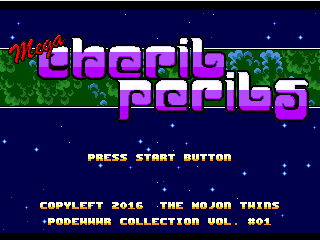Mega Cheril Perils
From Sega Retro
 |
This page contains content that is not safe for work. If you are viewing this page in a location with the potential for personal embarrassment, please click your browser's back button now. |
| Mega Cheril Perils | ||||||||||
|---|---|---|---|---|---|---|---|---|---|---|
| System(s): Sega Mega Drive | ||||||||||
| Publisher: 1985 Alternativo | ||||||||||
| Developer: The Mojon Twins | ||||||||||
| Genre: Platformer, Action | ||||||||||
| Number of players: 1 | ||||||||||
| Official in-game languages: | ||||||||||
|
Mega Cheril Perils is a homebrew adult platformer game based on Cheril Perils, a ZX Spectrum game that was developed by The Mojon Twins way back in 2010. The game was ported to the Sega Mega Drive in 2016, and featured better graphics, sound and gameplay. In 2017, this game was released physically by 1985 Alternativo as one of tier rewards for the Ninjajar! crowdfunding campaign on Verkami.[1]
Story
In the Badajoz jungle lives Cheril, a common girl, just like every other girl of her age. She eats cucumbers, hunts panthers with her bare teeth, flys around using hanging vines and dresses with suggestive animal furs. Nothing out of the blue. But Cheril, niece in second degree of Tartan, the scottish of the apes, has higher expectations. She’s fed up with Eleuterio, the ever serious monkey, which condemns her explosions of crazy and espontaneous youthness, with the lewd stares from Mondongo the aboriginal and his cousin Mojinganga, and with those damned snakes which ambush her from behind every bush in the jungle. She want’s something better. She’s decided to go to the city and become part of the “beautiful people”, just like her ancestor Tarzán of the Apes, which went to London and wore a nice Tuxedo.
Cheril gets on her way early in the morning, and soon get’s to the jungle limits. There she can behold a quite different kind of jungle: that made of asphalt and concrete. “I’m here, at last!” she exclaimed, and hit the streets. But, to her surprise, everything was silent… The streets were empty!
Unbeknownst to Cheril, the pharmaceutic enterprise “Parasol”, founded in the 60s by a couple of aberrating mad doctors, had developed a special virus which could make people incredibly beautiful and they decided to make their tests on the poor city inhabitants. The problem wasn’t the virus itself, which was awesomely well crafted and worked flawlessly, but the cistern truck which was used to transport it to the city: it was used to transport heavy morapio double-malt and wasn’t properly cleaned after that.
And, of course, everybody knows that beautifier virus plus morapio double malt makes infected people to become stupid brain-eating zombies. Cheril, completely unaware, arrived at the very same time the mayor of this town set up a strong magic barrier around the city after he had evacuated the very few “sane” inhabitants. When she realized, she was trapped inside. She wanted to exit the city, but the mayor wouldn’t remove the barrier while Zombies were still luring the city, so the only way for Cheril to escape from the doomed city was to “clean” the streets.[2]
Gameplay
The player controls Cheril, a completely naked woman, and must defeat all zombies in the game to clean the streets of the deadly virus.
Zombies should be avoided while they move, but there are a number of resonator devices scattered over the streets which, when activated, emit a special vibration which puts the zombies to sleep for a while. In such state, they are completely defenseless so Cheril can jump over them to make them disappear in a fancy cloud of dust.[3]
Levels

|
Level 1 |
|---|---|

|
Level 2 |
| Password: | |

|
Level 3 |
| Password: | |

|
Level 4 |
| Password: | |

|
Level 5 |
| Password: | |

